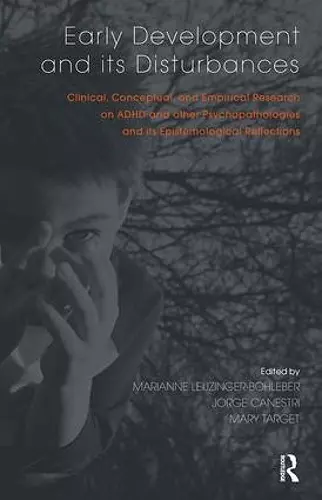Early Development and its Disturbances
Clinical, Conceptual and Empirical Research on ADHD and other Psychopathologies and its Epistemological Reflections
Marianne Leuzinger-Bohleber editor Jorge Canestri editor Mary Target editor
Format:Paperback
Publisher:Taylor & Francis Ltd
Published:31st Dec '10
Currently unavailable, and unfortunately no date known when it will be back
This paperback is available in another edition too:
- Hardback£135.00(9780367106607)

In this volume internationally well known experts discuss whether psychoanalysis - with its rich mix of clinical experiences and conceptualizations of early development and symptoms - has something unique to offer through deepening the understanding of children suffering from this and similar developmental disturbances. The contributors consider therapeutic strategies as well as possibilities of early prevention.Surprisingly, psychoanalysts have only during the past few years actively engaged in the on-going and very important controversial discussions on attention deficit hyperactivity disorder (ADHD). There may be many reasons for the increasing interest in this topic over the past few years - for example the dialogue between psychoanalysis and contemporary neurobiology/brain research which opens a fascinating window on an old problem in European culture: the mind-body problem. This exchange also promises to enlarge the understanding of psychic problems probably connected with some neurobiologically-based pathologies, widely assumed to include ADHD.Another area covered in this work shows that it might be that it is only during the last years that epigenetic researchers have been able empirically to demonstrate that early traumatization might strongly influence the 'triggering' of gene disposition, for example the genetic disposition to develop ADHD. This gives some reassurance that it may be relevant to treat children with ADHD psychoanalytically: psychoanalysts have expertise in understanding and treating children affected by early trauma, independent of their genetic disposition.
'This volume is long overdue. It provides indisputable research evidence to support what psychoanalysts have know for decades - that a monocausal etiological model to explain so complex a self-regulatory disorder as ADHD is inadequate. Now we have the evidence to justify a psychoanalytic treatment of these patients, even those who do benefit from stimulant medication. Kudos to the editors and their colleagues for providing research evidence to illustrate the continued applicability of psychoanalytic understanding and treatment to syndromes that often have a constitutional basis.'- Alan Sugarman, PhD, Child, Adolescent, and Adult Training and Supervising Psychoanalyst, San Diego Psychoanalytic Society and Institute; Clinical Professor of Psychiatry, University of California, San Diego'We have waited a long time for such a book! Looking from different points of view at early development, this volume is very interesting for the clinician and for the researcher. It especially highlights the developmental basis and psychopathology of the syndrome called ADHD (consisting of the three symptoms: attention deficit, hyperactivity and impulsivity), and shows what psychoanalysis and psychoanalytic psychotherapy can contribute to a favorable development of these children.'- Prof. Dr. Dieter Burgin, Professor of Child and Adolescent Psychiatriy, University of Basel; Training analyst of the Swiss Psychoanalytical Society; internationally well-known researcher on early child development
ISBN: 9781855757455
Dimensions: unknown
Weight: unknown
310 pages